The United Nations has voiced concern at force used by Macedonian riot police to disperse refugees trying to enter from Greece and urged the government to establish "orderly management" of its borders.
UN High Commissioner for Refugees Antonio Guterres spoke with Macedonian Foreign Minister Poposki on Friday and "received assurances that the border will not be closed in the future",the Geneva-based agency said in a statement.
UNHCR also called on authorities in Greece to provide urgent assistance to "people stranded on the Greek side of the border" and to help them move towards refugee reception facilities further from the border with its Balkan neighbour.
Earlier today, Macedonian riot police fired tear gas to disperse thousands of migrants and refugees trying to enter the Balkan country from Greece.
A Médecins Sans Frontieres team based in the Greek border village of Idomeni said it had treated ten people injured by stun grenades, with four hospitalised.
However, Macedonia's Interior Ministry spokesman Ivo Kotevski said there was "no incident, no tear bombs ... nothing like that on Macedonian side".
He also said the country is allowing migrants to enter from Greece in numbers that the country can provide transport and care for.
Mr Kotevski told Reuters: "We are allowing entry to a number that matches our capacity to transport them or to give them appropriate medical care and treatment."
In a statement, MSF said it also treated more than 100 people yesterday and said there are around 3,000 people gathered at the border where there is a lot of frustration and anger among migrants and refugees due to the border closure.
Three people were sent to hospital including a pregnant woman and a one-year-old baby from Syria who is recovering from a head operation carried out a few months ago.
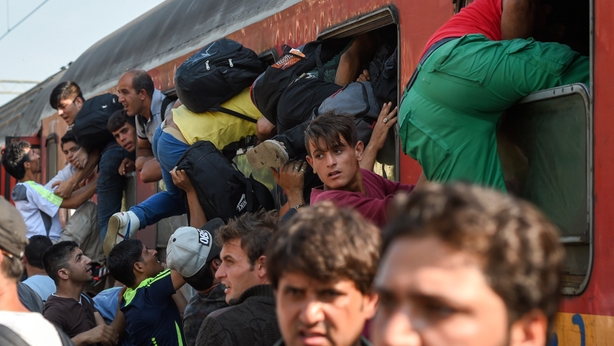

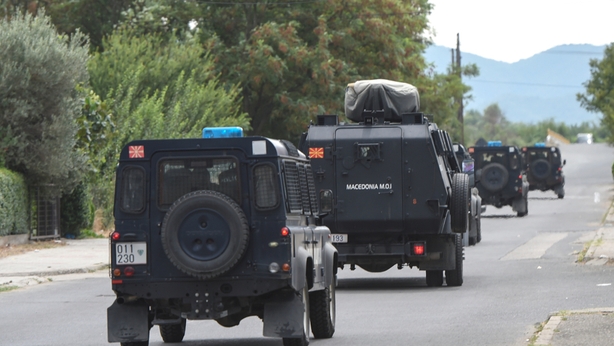
A 24-year-old refugee who said he had been beaten by Macedonian police was also hospitalised.
Several thousand people from the Middle East, Africa and Asia, many Syrian refugees, spent a cold night in no-man's land after Macedonia yesterday declared a state of emergency and effectively sealed its southern frontier to migrants and refugees.
Riot police behind barbed wire fired tear gas to drive back an angry crowd demanding passage into Macedonia and north to Hungary and the European Union's borderless Schengen zone.
Authorities in Macedonia said official border crossings remained open, but they would "reduce illegal border entry to a minimum".
Macedonian police fire tear gas to disperse thousands of migrants trying to enter from Greece https://t.co/AL8jbhZlwf
— RTÉ News (@rtenews) August 21, 2015
A Reuters reporter near the border town of Gevgelija said a column of riot police armed with tear gas and armoured vehicles had shut off passage for several thousand people.
"No more Macedonia," one officer said in English to a Syrian man requesting passage.
The flow into Gevgelija, which has hit 1,500 to 2,000 a day, suddenly stopped.
The shutdown came after days of desperate scenes at the local railway station as thousands of people pressed to board trains to Serbia, young children being passed through open carriage windows.
Macedonia acted as a Greek car ferry docked in Athens carrying 2,400 Syrian refugees from the island of Kos, just some of the 50,000 Middle Eastern, African and Asian migrants and refugees who arrived in Greece in July alone.
Many will take buses north, heading for Macedonia, then Serbia and Europe's borderless Schengen zone in Hungary.
"We cannot hermetically close the borders," Mr Kotevski said. But "we will try to reduce illegal border entry to a minimum."
Mr Kotevski said there was no coordination between Greek and Macedonian police.
The two countries have has an uneasy relationship, rooted in a dispute over Macedonia's name, since it declared independence from Yugoslavia in 1991, a row that has blocked Skopje's integration with NATO and the European Union.
Mr Kotevski said a state of emergency had been declared on the northern and southern borders and that soldiers would be brought in to help address a crisis that is straining the capacity of cash-strapped Macedonia and Serbia.
To the north, Hungary is racing to complete a fence along its 175km border with Serbia to keep them out, threatening to create a bottleneck of tens of thousands.
Macedonia appealed on Wednesday for neighbouring countries to send train carriages to address the demand.
But the United Nations refugee agency urged the government to do more, saying it should allocate a site to accommodate the migrants and refugees.
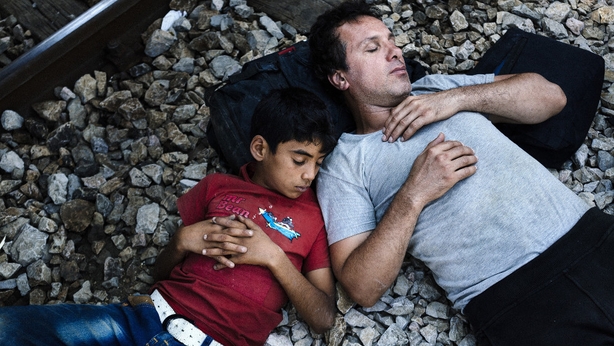
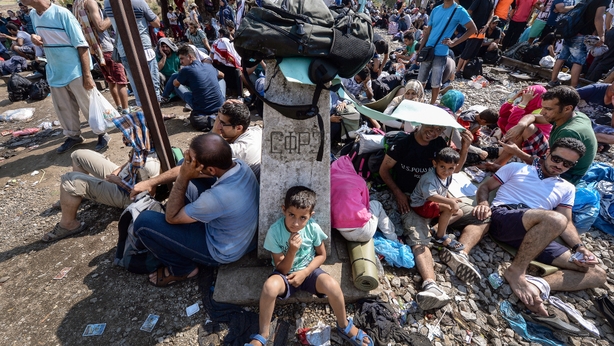
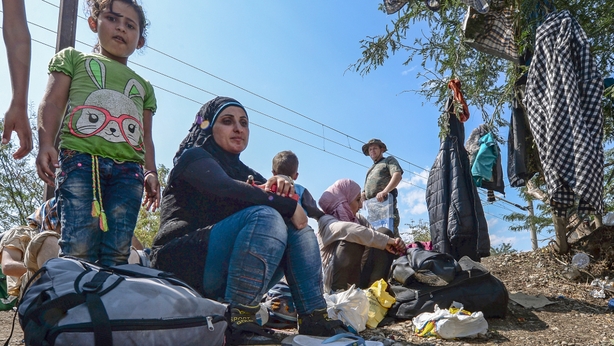
"Depending on how Greece uses ships to de-congest the islands, that will also temporarily increase the arrivals here," Alexandra Krause, senior protection officer at the UNHCR in the Macedonian capital, Skopje.
The only site currently being used is at the local police station, where Ms Krause said the UNHCR had constructed some shelter with capacity for just 165 people.
She said the Red Cross had access to the migrants and refugees in the border area but warned of harsher weather approaching.
Arson attack on refugee centre in Germany
Separately, arsonists attacked a refugee shelter in the southern German state of Bavaria, police said, as authorities struggle to cope with the biggest influx of people fleeing violence and poverty in the nation's post-war history.
Yesterday, 17 people were injured in a riot in a refugee shelter in central Germany over a torn Koran and politicians have warned of growing tensions with the number of asylum-seekers and refugees expected to quadruple this year.
Firefighters were able to get the fire at the refuge in Neustadt an der Waldnaab quickly under control after a resident alerted authorities to the fire in the early hours of this morning.
A refugee told police he saw two people jumping out of a ground floor window and a third person in front of the home who all fled.
Police said they could not rule out a possible xenophobic motive, but were following all lines of inquiry.
The 19 residents, who included three children, were not injured and all returned to the former guesthouse which is being used to house asylum-seekers.
There were 150 arson or other attacks that damaged or destroyed refugee shelters in the first six months of the year.
Interior Minister Thomas de Maiziere said on Wednesday that Germany expects the number of asylum-seekers and refugees to reach around 800,000 this year - more than the entire population of Frankfurt am Main.
Even so, 60% of Germans believe their country can cope with the influx, up from 54% in July, according to a poll published by broadcaster ZDF today.

